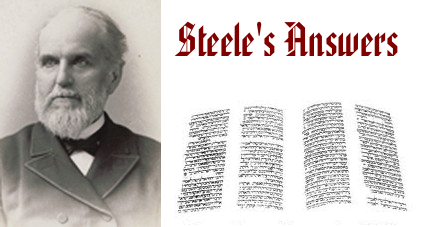"This is the portion of the anointing of Aaron, and of the anointing of his sons, out of the offerings of the LORD made by fire, in the day when he presented them to minister unto the LORD in the priest’s office; Which the LORD commanded to be given them of the children of Israel, in the day that he anointed them, by a statute for ever throughout their generations. This is the law of the burnt offering, of the meat offering, and of the sin offering, and of the trespass offering, and of the consecrations, and of the sacrifice of the peace offerings; Which the LORD commanded Moses in mount Sinai, in the day that he commanded the children of Israel to offer their oblations unto the LORD, in the wilderness of Sinai." — Leviticus 7:35-38 KJV.
SUMMARY OF PRECEDING LAWS, 35-38.35. This is the portion of the anointing of Aaron — This is the provision made for those who are anointed priests — the perquisite by virtue of the holy office. The abstract anointing is put for the concrete, the anointed.
36. In the day that he anointed them — The command given on that day extends over the whole period of the Aaronic priesthood. A statute for ever — See Leviticus 3:17, note.
37. Burnt offering — Chap. 1, notes, and Leviticus 6:8-13, notes. Meat offering — Chap. 2, and Leviticus 6:14-18, notes. Sin offering — Chap. 4, notes, and Leviticus 6:25-30. Trespass offering — Chapter 5-6:7; 7:1-7, notes. The consecrations — This consisted in filling the hands of the priests with the things which they were to offer. See Numbers 3:3, note. It is an expressive mode of inducting them into office. This ordinance is not distinctly spoken of in the previous chapters except in part in Leviticus 6:19-23, but the offerings of which the consecration is made up have been already detailed, as will be seen in chap. 8. Peace offerings — Chaps. 3, 7:11-34. notes. “The sacrificial law, therefore, with the five species of sacrifices which it enjoins, embraces every aspect in which Israel was to manifest its true relation to the Lord its God. While the expiatory sacrifices furnished the means of removing the barrier which sins and trespasses had set up between the sinner and the holy God, and procured the forgiveness of sin and guilt, so that the sinner could attain once more to the unrestricted enjoyment of the covenanted grace, the sanctification of the whole man in self-surrender to the Lord was shadowed forth in the burnt offerings, the fruits of this sanctification in the meat offerings, and the blessedness of the possession and enjoyment of saving grace in the peace offerings. Nevertheless the sacrifices could not make those who drew near to God with them and in them “perfect as pertaining to the conscience,” (Hebrews 9:9; 10:1,) because the blood of bulls and of goats could not possibly take away sin. Hebrews 10:4. The forgiveness of sin which the atoning sacrifices procured was only a paresiv (a passing by) of past sins through the forbearance of God, (Romans 3:25, 26,) in anticipation of the true sacrifice of Christ, of which the animal sacrifices were only a type, and by which the justice of God is satisfied, and the way opened for full forgiveness of sin and complete reconciliation to God.” — Keil. See Introduction, 5, 6, 7.
CONCLUDING NOTE.
That this sacrificial code was burdensome will not be denied by those who have enjoyed the more glorious dispensation of the Spirit. There is a striking contrast between the sacrificial law and “the law of liberty” in Christ Jesus our Lord. The great purpose of the first was the ushering in of the second. In this regard not only the moral law but the ceremonial, also, was our paidagwgov, child-leader, to bring us to Christ. All the shadows adumbrate him; all the types prefigure him in his various mediatorial offices. This will account for the variety of the sacrifices containing an expiatory element. A subordinate purpose of this variety may have been to prevent that tedium which would have attended one invariable form of sacrifice. Rationalism suggests that this complicated and elaborate system was devised simply to keep the Israelites so busily employed that they would have no inclination to adopt the idolatries of the surrounding nations, especially the religious rites with which they had become familiar in Egypt. But the suggestion that God has created any thing for the sole purpose of filling a vacuum is not only a reflection on his wisdom, but a glaring indication of a lack, on the part of Rationalism, of that true spirit of philosophy which is satisfied only with the discovery of worthy final causes of things. “These rites and ceremonies were minute, in order to impress upon the Jewish mind, and upon the mind of humanity itself, the great ideas of substitution, atonement, vicarious sacrifice; till this idea became so familiarized to the hearts of mankind that they should be able not only to appreciate, but to hail with joy and gratitude that perfect atonement of which these were the shadows, saying, each of them, ‘We are voices crying in the wilderness, Behold the Lamb of God, which taketh away the sin of the world!’” — Dr. Cummings.




.png)
.png)


.jpg)


.png)


.jpg)

